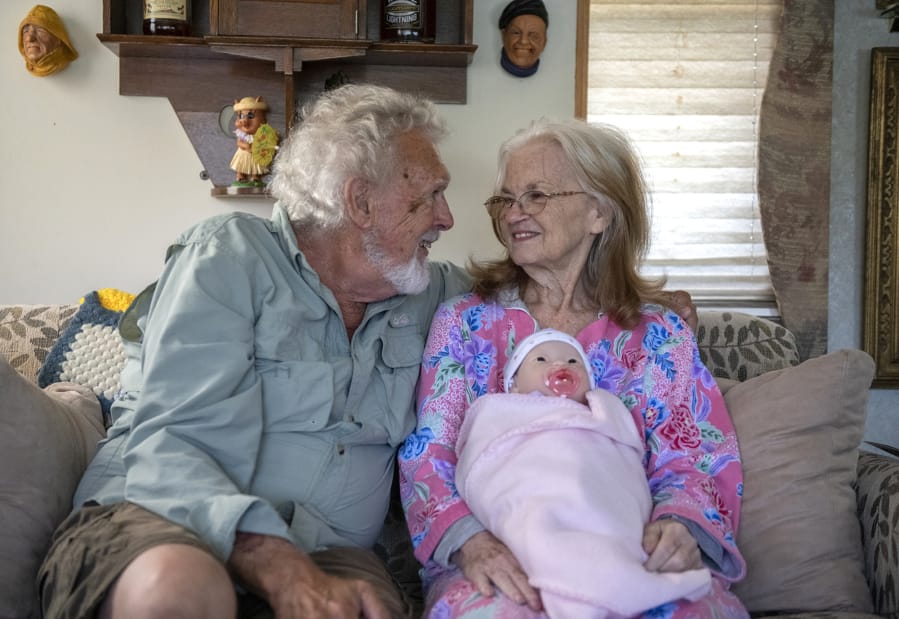It’s hard to separate MaryAnn St. Mars from her baby.
St. Mars isn’t a new mother, but rather a 75-year-old Woodland resident with dementia, who has four children, nine grandchildren and four great-grandchildren. None of them are her “baby,” which she can be found holding, and even falling asleep with, in her recliner in her living room. The baby is a stuffed doll, and it’s given her a lot of joy.
St. Mars received the doll free of charge from Hope Dementia Support Group, a Vancouver nonprofit that offers care to partners of those experiencing memory loss through support groups, along with other resources. The idea is the dolls offer comfort to and help calm people with dementia, which includes symptoms such as irritability and frustration.
For St. Mars, the doll has provided a sense of purpose in her current state. As her husband, Ted, says, “She has no hobbies, nothing to entertain herself, other than getting into trouble.” Her husband likes to leave out coasters, cards and envelopes because St. Mars likes to collect them and hide them. She also likes to straighten things up and fold blankets. Her husband believes the doll has brought out some of the motherly instincts St. Mars developed with her own children.
Her doll provides “instant happiness, regardless of her mood swings” any time it’s brought out, Ted St. Mars said.
If You Go
What: Hope Dementia Support Group fundraiser dinner auction.
When: 5 p.m. Sept. 21.
Where: Moonlight Events, 10017 N.E. Sixth Ave., Vancouver.
Cost: $75 per ticket.
Info: Register online at hopedementiasupport.org, email alwaysHOPEinfo@gmail.com or call 951-237-7847.
“She loves that little baby,” he continued. “She treats it like an honest-to-God baby.”
Lynn Crawford, the executive director for Hope, said the baby dolls provide calmness to those with dementia, as do the stuffed animals Hope also distributes. This can decrease the daily struggle for primary caretakers, and in turn decrease their stress levels. So far Hope has presented about 10 dolls and stuffed animals to patients.
“It’s very gratifying to see how much people enjoy these dolls,” Crawford said. “People who have dementia have a tendency to — they remember long-term memories. They remember their childhood, and remember when their children were babies. So they really appreciate the baby dolls.”
Crawford’s husband, Ronald, died three years ago at age 75, after fighting Lewy body dementia. Crawford said her husband enjoyed dolls after his dementia diagnosis. In her role as executive director, Crawford has been encouraged by the anecdotal evidence she’s seen that the dolls are creating a positive impact.
“It makes you feel like you are doing something meaningful for these people,” Crawford said.
Michael Parker, a 69-year-old with dementia who lives at a Vancouver adult family home, grew up with dogs as an important part of his life in Spokane County. His family had a kennel, and they would take mastiffs and corgis to dog shows in the Northwest.
Later in life he had two dogs named Nubbin and Sadie, and he keeps their pictures on his dresser now. Parker is also the owner of Jester, a stuffed electronic dog that can bark, bat its eyelashes and wag its tail. Parker said the dog doesn’t do much for him, but he’s given it to other residents at his adult home if they become frustrated. He said, “When you get dementia and go into a home, you don’t like it at all.” So Parker sometimes brings out Jester for comfort.
He named Jester after a golden retriever he had growing up.
“It has made people happy,” he said while sitting next to Jester on his bed. “I don’t know how it works. It just works.”




